ed和ing结尾的形容词的区别
以ing和ed结尾的形容词用法

以ing和ed结尾的形容词用法英语中,以-ing和-ed结尾的形容词称为分词形容词(participial adjectives),它们常常用于描述人或物的特征或状态。
下面将介绍这两种形容词的用法和区别。
1. 以-ing结尾的形容词以-ing结尾的形容词表示被动、描述状态或特征,常用来形容事物的性质或特点。
它们可以修饰人、物、地点等。
例如:- The stunning sunset painted the sky with vibrant colors.(令人惊叹的日落用绚丽的颜色给天空涂抹上了色彩。
)- I found the book boring and couldn't finish reading it.(我觉得这本书无聊,无法读完。
)- She is a caring teacher who always listens to her students' problems.(她是一位关心学生的老师,总是倾听学生的问题。
)2. 以-ed结尾的形容词以-ed结尾的形容词表示感受、描述人或物的状态,常用来形容人的感受或状态。
例如:- I'm really excited about the upcoming vacation.(我对即将到来的假期感到非常兴奋。
)- He was surprised to see his old friend at the party.(他在聚会上见到老朋友感到很惊讶。
)- The frightened child ran into her mother's arms for comfort.(受到惊吓的孩子跑到妈妈的怀里寻求安慰。
)需要注意的是,有些形容词既可以以-ing也可以以-ed结尾,但含义可能不同。
例如:interested(对某事感兴趣)和 interesting(有趣的)。
在使用时,我们需要根据上下文来确定正确的形容词。
ed形容词和ing形容词
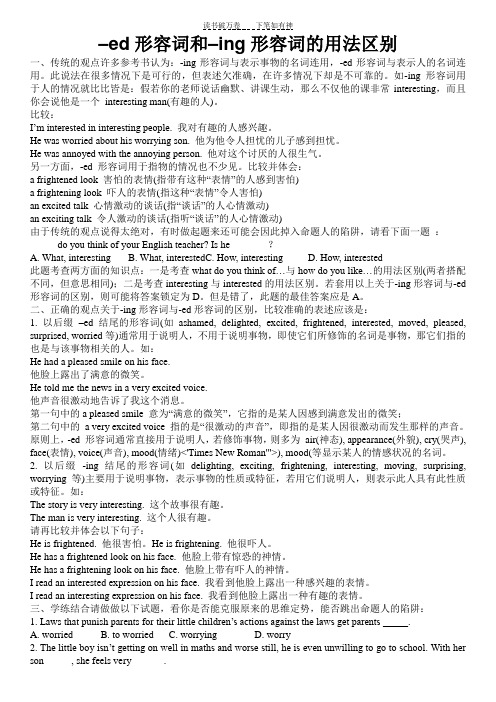
–ed形容词和–ing形容词的用法区别一、传统的观点许多参考书认为:-ing形容词与表示事物的名词连用,-ed形容词与表示人的名词连用。
此说法在很多情况下是可行的,但表述欠准确,在许多情况下却是不可靠的。
如-ing 形容词用于人的情况就比比皆是:假若你的老师说话幽默、讲课生动,那么不仅他的课非常interesting,而且你会说他是一个interesting man(有趣的人)。
比较:I’m interested in interesting people. 我对有趣的人感兴趣。
He was worried about his worrying son. 他为他令人担忧的儿子感到担忧。
He was annoyed with the annoying person. 他对这个讨厌的人很生气。
另一方面,-ed 形容词用于指物的情况也不少见。
比较并体会:a frightened look 害怕的表情(指带有这种“表情”的人感到害怕)a frightening look 吓人的表情(指这种“表情”令人害怕)an excited talk 心情激动的谈话(指“谈话”的人心情激动)an exciting talk 令人激动的谈话(指听“谈话”的人心情激动)由于传统的观点说得太绝对,有时做起题来还可能会因此掉入命题人的陷阱,请看下面一题:_____ do you think of your English teacher? Is he _______?A. What, interestingB. What, interestedC. How, interestingD. How, interested此题考查两方面的知识点:一是考查what do you think of…与how do you like…的用法区别(两者搭配不同,但意思相同);二是考查interesting与interested的用法区别。
以ed和ing结尾的形容词有何区别呢?
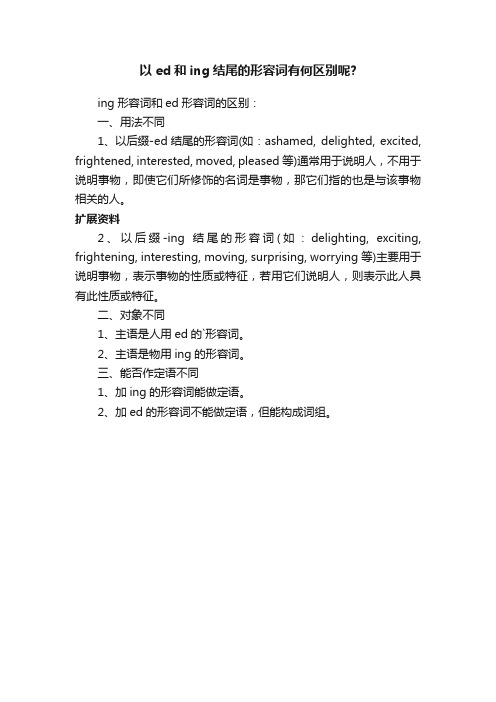
以ed和ing结尾的形容词有何区别呢?
ing形容词和ed形容词的区别:
一、用法不同
1、以后缀-ed结尾的形容词(如:ashamed, delighted, excited, frightened, interested, moved, pleased等)通常用于说明人,不用于说明事物,即使它们所修饰的名词是事物,那它们指的也是与该事物相关的人。
扩展资料
2、以后缀-ing结尾的形容词(如:delighting, exciting, frightening, interesting, moving, surprising, worrying等)主要用于说明事物,表示事物的性质或特征,若用它们说明人,则表示此人具有此性质或特征。
二、对象不同
1、主语是人用ed的`形容词。
2、主语是物用ing的形容词。
三、能否作定语不同
1、加ing的形容词能做定语。
2、加ed的形容词不能做定语,但能构成词组。
形容词ed和ing用法

形容词ed和ing用法一、形容词 -ed和 -ing的词性解释1. -ed形容词- 词性:形容词。
它是由动词的过去分词形式转化而来的。
- 意思:通常用来描述人的感受、情绪或状态。
- 用法:一般作表语,用来修饰人或有类似人的情感的主语。
- 近义词:无特定的固定近义词形式,但可根据具体的 -ed形容词含义找到表达相似情感的其他形容词。
例如,“surprised”(感到惊讶的)近义词可以是“astonished”。
- 双语例句:- I was really excited when I heard the good news. (当我听到这个好消息时,我真的很兴奋。
)- She looked disappointed when she didn't get the job. (当她没有得到那份工作时,她看起来很失望。
)- He seemed tired after a long day at work. (在工作了漫长的一天后,他看起来很疲惫。
)- They were bored with the long speech. (他们对冗长的演讲感到厌烦。
)- My friend was frightened by the sudden noise. (我的朋友被突然的噪音吓了一跳。
)- You look confused. Do you need some help? (你看起来很困惑。
你需要一些帮助吗?)- We were satisfied with the service in the restaurant. (我们对餐厅的服务很满意。
)- She was amazed at his magic tricks. (她对他的魔术感到惊奇。
)- The little girl was embarrassed when she made a mistake in public. (这个小女孩在公众场合犯错时感到很尴尬。
–ed形容词和–ing形容词的用法区别

–ed形容词和–ing形容词的用法区别一、传统的观点许多参考书认为:-ing形容词与表示事物的名词连用,-ed形容词与表示人的名词连用。
此说法在很多情况下是可行的,但表述欠准确,在许多情况下却是不可靠的。
如-ing 形容词用于人的情况就比比皆是:假若你的老师说话幽默、讲课生动,那么不仅他的课非常interesting,而且你会说他是一个interesting man(有趣的人)。
比较:I’m interested in interesting people. 我对有趣的人感兴趣。
He was worried about his worrying son. 他为他令人担忧的儿子感到担忧。
He was annoyed with the annoying person. 他对这个讨厌的人很生气。
另一方面,-ed 形容词用于指物的情况也不少见。
比较并体会:a frightened look 害怕的表情(指带有这种“表情”的人感到害怕)a frightening look 吓人的表情(指这种“表情”令人害怕)an excited talk 心情激动的谈话(指“谈话”的人心情激动)an exciting talk 令人激动的谈话(指听“谈话”的人心情激动)由于传统的观点说得太绝对,有时做起题来还可能会因此掉入命题人的陷阱,请看下面一题:_____ do you think of your English teacher? Is he _______?A. What, interestingB. What, interestedC. How, interestingD. How, interested此题考查两方面的知识点:一是考查what do you think of…与how do you like…的用法区别(两者搭配不同,但意思相同);二是考查interesting与interested的用法区别。
ing和ed结尾的形容词大全及辨析

以ing 和ed 结尾的形容词的区别By Uganenglish1. 以ing结尾的动词变化而来的形容词一般修饰物,译为“令人…的”,常作定语;excitingnews,主要用于说明事物,表示事物的性质或特征,若用它们说明人,则表示此人具有此性质或特征。
2. 以-ed结尾的动词变化而来的形容词一般修饰人,译为“(人)…的”,常作表语;I amexcited. 通常用于说明人,不用于说明事物,即使它们所修饰的名词是事物,那它们指的也是与该事物相关的人。
十五组形容词:encouraging 令人鼓舞的 encouraged 受到鼓舞的interesting 有趣的 interested 感兴趣的astonishing令人惊呆的astonished 惊呆的surprising 令人惊奇的 surprised感到好奇的moving 令人感动的moved 感动的frightening令人害怕的frightened害怕的terrifying令人恐惧terrified感到恐惧的puzzling 令人困惑不解的 puzzled感到困惑的satisfying令人满意的 satisfied感到满意的tiring 令人厌倦的 tired感到厌烦的amazing令人惊讶的 amazed感到惊讶的boring 令人讨厌的 bored感到厌烦的exciting令人兴奋的 excited感到激动的touching 触动人心的 touched感动的embarrassing令人尴尬的 embarrassed尴尬的1. He had a pleased smile on his face. 他脸上露出了满意的微笑。
2. He told me the news in a very excited voice. 他告诉了我这个消息,声音很激动。
3. The story is very interesting. 这个故事很有趣。
4. The man is very interesting. 这个人很有趣。
带ed形容词
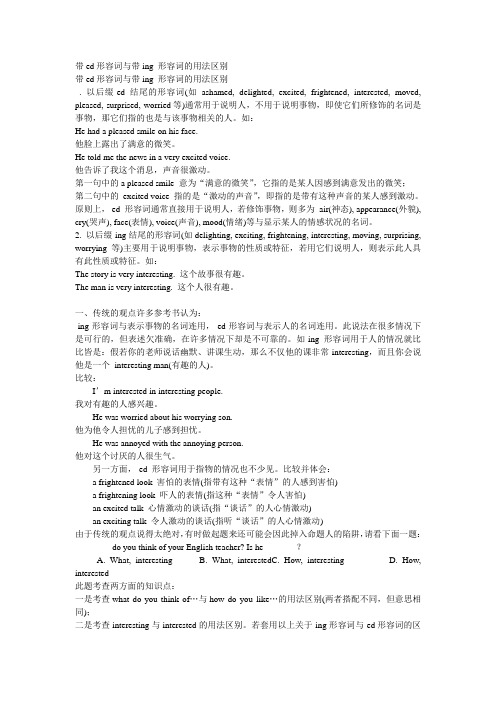
带ed形容词与带ing 形容词的用法区别带ed形容词与带ing 形容词的用法区别. 以后缀-ed结尾的形容词(如ashamed, delighted, excited, frightened, interested, moved, pleased, surprised, worried等)通常用于说明人,不用于说明事物,即使它们所修饰的名词是事物,那它们指的也是与该事物相关的人。
如:He had a pleased smile on his face.他脸上露出了满意的微笑。
He told me the news in a very excited voice.他告诉了我这个消息,声音很激动。
第一句中的a pleased smile 意为“满意的微笑”,它指的是某人因感到满意发出的微笑;第二句中的excited voice 指的是“激动的声音”,即指的是带有这种声音的某人感到激动。
原则上,-ed 形容词通常直接用于说明人,若修饰事物,则多为air(神态), appearance(外貌), cry(哭声), face(表情), voice(声音), mood(情绪)等与显示某人的情感状况的名词。
2. 以后缀-ing结尾的形容词(如delighting, exciting, frightening, interesting, moving, surprising, worrying 等)主要用于说明事物,表示事物的性质或特征,若用它们说明人,则表示此人具有此性质或特征。
如:The story is very interesting. 这个故事很有趣。
The man is very interesting. 这个人很有趣。
一、传统的观点许多参考书认为:-ing形容词与表示事物的名词连用,-ed形容词与表示人的名词连用。
此说法在很多情况下是可行的,但表述欠准确,在许多情况下却是不可靠的。
如-ing 形容词用于人的情况就比比皆是:假若你的老师说话幽默、讲课生动,那么不仅他的课非常interesting,而且你会说他是一个interesting man(有趣的人)。
–ed形容词和–ing形容词的用法区别
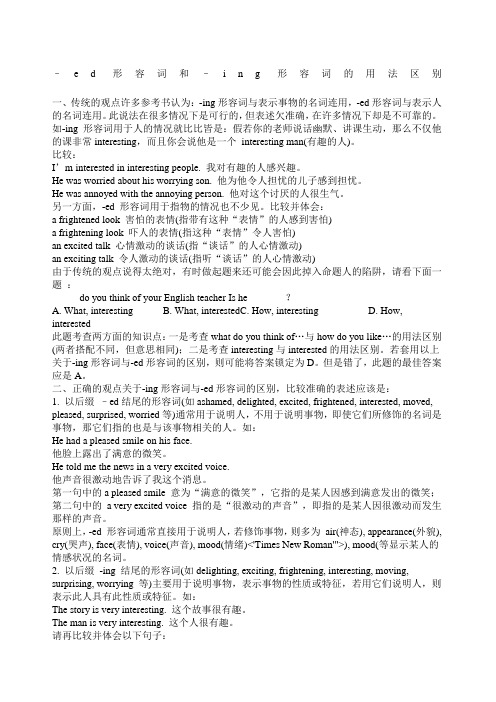
–e d形容词和–i n g形容词的用法区别一、传统的观点许多参考书认为:-ing形容词与表示事物的名词连用,-ed形容词与表示人的名词连用。
此说法在很多情况下是可行的,但表述欠准确,在许多情况下却是不可靠的。
如-ing 形容词用于人的情况就比比皆是:假若你的老师说话幽默、讲课生动,那么不仅他的课非常interesting,而且你会说他是一个interesting man(有趣的人)。
比较:I’m interested in interesting people. 我对有趣的人感兴趣。
He was worried about his worrying son. 他为他令人担忧的儿子感到担忧。
He was annoyed with the annoying person. 他对这个讨厌的人很生气。
另一方面,-ed 形容词用于指物的情况也不少见。
比较并体会:a frightened look 害怕的表情(指带有这种“表情”的人感到害怕)a frightening look 吓人的表情(指这种“表情”令人害怕)an excited talk 心情激动的谈话(指“谈话”的人心情激动)an exciting talk 令人激动的谈话(指听“谈话”的人心情激动)由于传统的观点说得太绝对,有时做起题来还可能会因此掉入命题人的陷阱,请看下面一题:_____ do you think of your English teacher Is he _______?A. What, interestingB. What, interestedC. How, interestingD. How, interested此题考查两方面的知识点:一是考查what do you think of…与how do you like…的用法区别(两者搭配不同,但意思相同);二是考查interesting与interested的用法区别。
高中英语ing和ed结尾的形容词辨析(答案不全)
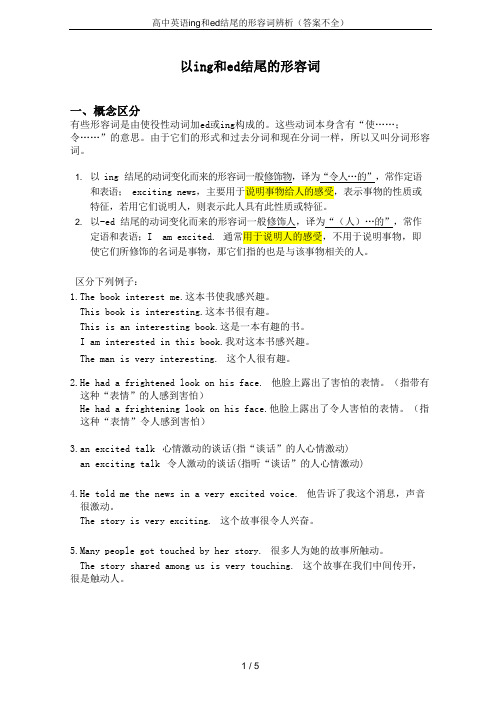
以ing和ed结尾的形容词一、概念区分有些形容词是由使役性动词加ed或ing构成的。
这些动词本身含有“使……;令……”的意思。
由于它们的形式和过去分词和现在分词一样,所以又叫分词形容词。
1. 以 ing 结尾的动词变化而来的形容词一般修饰物,译为“令人…的”,常作定语和表语; exciting news,主要用于说明事物给人的感受,表示事物的性质或特征,若用它们说明人,则表示此人具有此性质或特征。
2. 以-ed 结尾的动词变化而来的形容词一般修饰人,译为“(人)…的”,常作定语和表语;I am excited. 通常用于说明人的感受,不用于说明事物,即使它们所修饰的名词是事物,那它们指的也是与该事物相关的人。
区分下列例子:1.The book interest me.这本书使我感兴趣。
This book is interesting.这本书很有趣。
This is an interesting book.这是一本有趣的书。
I am interested in this book.我对这本书感兴趣。
The man is very interesting. 这个人很有趣。
2.He had a frightened look on his face. 他脸上露出了害怕的表情。
(指带有这种“表情”的人感到害怕)He had a frightening look on his face.他脸上露出了令人害怕的表情。
(指这种“表情”令人感到害怕)3.an excited talk 心情激动的谈话(指“谈话”的人心情激动)an exciting talk 令人激动的谈话(指听“谈话”的人心情激动)4.He told me the news in a very excited voice. 他告诉了我这个消息,声音很激动。
The story is very exciting. 这个故事很令人兴奋。
5.Many people got touched by her story. 很多人为她的故事所触动。
(完整版)ed形容词和ing形容词[1]
![(完整版)ed形容词和ing形容词[1]](https://img.taocdn.com/s3/m/7cf26842a1c7aa00b42acb1f.png)
–ed形容词和–ing形容词的用法区别一、传统的观点许多参考书认为:-ing形容词与表示事物的名词连用,-ed形容词与表示人的名词连用。
此说法在很多情况下是可行的,但表述欠准确,在许多情况下却是不可靠的。
如-ing 形容词用于人的情况就比比皆是:假若你的老师说话幽默、讲课生动,那么不仅他的课非常interesting,而且你会说他是一个interesting man(有趣的人)。
比较:I’m interested in interesting people. 我对有趣的人感兴趣。
He was worried about his worrying son. 他为他令人担忧的儿子感到担忧。
He was annoyed with the annoying person. 他对这个讨厌的人很生气。
另一方面,-ed 形容词用于指物的情况也不少见。
比较并体会:a frightened look 害怕的表情(指带有这种“表情”的人感到害怕)a frightening look 吓人的表情(指这种“表情”令人害怕)an excited talk 心情激动的谈话(指“谈话”的人心情激动)an exciting talk 令人激动的谈话(指听“谈话”的人心情激动)由于传统的观点说得太绝对,有时做起题来还可能会因此掉入命题人的陷阱,请看下面一题:_____ do you think of your English teacher? Is he _______?A. What, interestingB. What, interestedC. How, interestingD. How, interested此题考查两方面的知识点:一是考查what do you think of…与how do you like…的用法区别(两者搭配不同,但意思相同);二是考查interesting与interested的用法区别。
ed和ing形容词总结
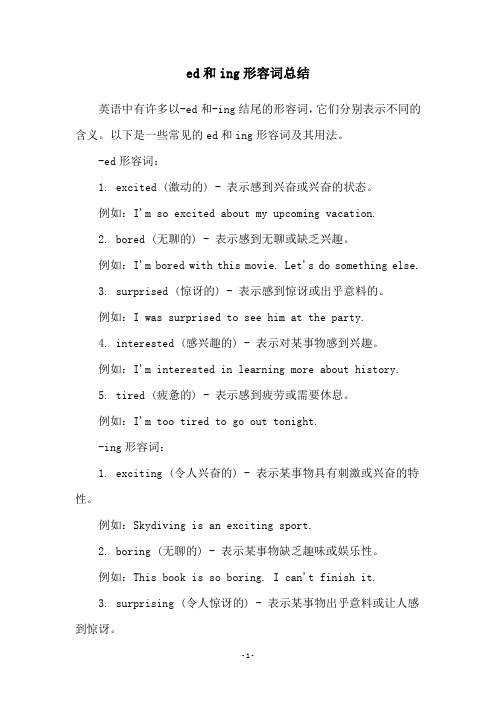
ed和ing形容词总结英语中有许多以-ed和-ing结尾的形容词,它们分别表示不同的含义。
以下是一些常见的ed和ing形容词及其用法。
-ed形容词:1. excited (激动的) - 表示感到兴奋或兴奋的状态。
例如:I'm so excited about my upcoming vacation.2. bored (无聊的) - 表示感到无聊或缺乏兴趣。
例如:I'm bored with this movie. Let's do something else.3. surprised (惊讶的) - 表示感到惊讶或出乎意料的。
例如:I was surprised to see him at the party.4. interested (感兴趣的) - 表示对某事物感到兴趣。
例如:I'm interested in learning more about history.5. tired (疲惫的) - 表示感到疲劳或需要休息。
例如:I'm too tired to go out tonight.-ing形容词:1. exciting (令人兴奋的) - 表示某事物具有刺激或兴奋的特性。
例如:Skydiving is an exciting sport.2. boring (无聊的) - 表示某事物缺乏趣味或娱乐性。
例如:This book is so boring. I can't finish it.3. surprising (令人惊讶的) - 表示某事物出乎意料或让人感到惊讶。
例如:It was a surprising turn of events.4. interesting (有趣的) - 表示某事物具有吸引人的特性。
例如:This article is very interesting.5. tiring (令人疲劳的) - 表示某事物需要付出精力或感到疲劳。
ed形容词和-ing 形容词
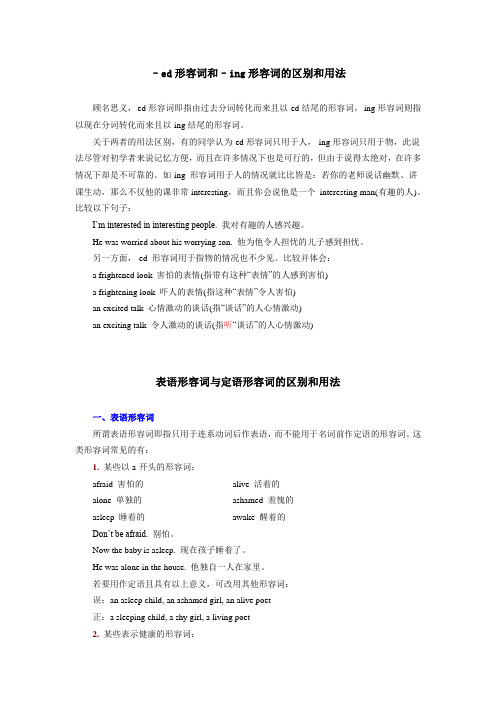
–ed形容词和–ing形容词的区别和用法顾名思义,-ed形容词即指由过去分词转化而来且以-ed结尾的形容词,-ing形容词则指以现在分词转化而来且以-ing结尾的形容词。
关于两者的用法区别,有的同学认为-ed形容词只用于人,-ing形容词只用于物,此说法尽管对初学者来说记忆方便,而且在许多情况下也是可行的,但由于说得太绝对,在许多情况下却是不可靠的。
如-ing 形容词用于人的情况就比比皆是:若你的老师说话幽默、讲课生动,那么不仅他的课非常interesting,而且你会说他是一个interesting man(有趣的人)。
比较以下句子:I’m interested in interesting people. 我对有趣的人感兴趣。
He was worried about his worrying son. 他为他令人担忧的儿子感到担忧。
另一方面,-ed 形容词用于指物的情况也不少见。
比较并体会:a frightened look 害怕的表情(指带有这种“表情”的人感到害怕)a frightening look 吓人的表情(指这种“表情”令人害怕)an excited talk 心情激动的谈话(指“谈话”的人心情激动)an exciting talk 令人激动的谈话(指听“谈话”的人心情激动)表语形容词与定语形容词的区别和用法一、表语形容词所谓表语形容词即指只用于连系动词后作表语,而不能用于名词前作定语的形容词。
这类形容词常见的有:1.某些以a-开头的形容词:afraid 害怕的alive 活着的alone 单独的ashamed 羞愧的asleep 睡着的awake 醒着的Don’t be afraid. 别怕。
Now the baby is asleep. 现在孩子睡着了。
He was alone in the house. 他独自一人在家里。
若要用作定语且具有以上意义,可改用其他形容词:误:an asleep child, an ashamed girl, an alive poet正:a sleeping child, a shy girl, a living poet2.某些表示健康的形容词:fine 健康的ill有病的well身体健康的“How’s your wife?” “She’s fine, thank you.” “你妻子好吗?”“她很好,谢谢。
接ing和ed的形容词修饰后面的名词时怎么区别

接ing和ed的形容词修饰后面的名词时怎么区别
用法不同:
以后缀-ed结尾的形容词(如:ashamed, delighted, excited, frightened, interested, moved, pleased等)通常用于说明人,不用于说明事物,即使它们所修饰的名词是事物,那它们指的也是与该事物相关的人。
扩展资料
以后缀-ing结尾的'形容词(如:delighting, exciting, frightening, interesting, moving, surprising, worrying等)主要用于说明事物,表示事物的性质或特征,若用它们说明人,则表示此人具有此性质或特征。
对象不同:
主语是人用ed的形容词。
主语是物用ing的形容词。
能否作定语不同:
加ing的形容词能做定语。
加ed的形容词不能做定语,但能构成词组。
-ing与-ed的形容词的用法

-ing结尾的形容词与-ed结尾的形容词的用法以-ing和-ed的结尾的形容词,常用来表示“特征”和“状态”。
具体用法如下:1、-ing 结尾的形容词1)-ing 结尾的形容词,主要用于说明事物,表示事物的性质或特征,若用它们说明人,则表示此人具有此性质或特征。
通常译为“令人……的”。
(如:amazing令人吃惊的boring 令人厌烦的embarrassing令人尴尬的,令人难堪的interesting 有趣的surprising 令人吃惊的worrying 令人着急的exciting令人激动的等)。
如:(1) The story is very interesting. 这个故事很有趣。
(2) The man is very interesting. 这个人很有趣。
比较并体会以下句子:He is frightened. 他很害怕。
He is frightening. 他很吓人。
2) 在句中作表语、定语和补语。
(1) The father was disappointed at the disappointing news that his son failed the exam. 听到儿子考试不及格这个令人失望的消息,父亲感到很失望。
(定语)(2)The film is very boring.这部电影很乏味。
(表语)(3)He found it interesting to play games with his sister .他觉得和他的妹妹一起玩游戏很有趣。
2、.以后缀–ed结尾的形容词1)–ed结尾的形容词,通常用于说明句中主语(人)的情绪变化,常译为“某人感到……的”。
(如amazed吃惊的/惊讶的bored感到厌烦的embarrassed尴尬的,难堪的,困窘的interested 感到有趣的surprised感到吃惊的worried感到着急的excited感到激动的; delighted, pleased高兴的;disappointed失望的等)。
Ed与Ing形容词OK

3. After the Anti-terrorist War, the American soldiers returned home ______.A. safe but tiredB. safely but tiredC. safe and tiringD. safely and tiring4. As we all know, typing is a ______ job to a ______ heart.A. tired; tiredB. tired; tiringC. tiring; tiredD. tiring; tiring5. Poor boy! His________ looks and ________hands suggested he was very afraid.A. frightful; tremblingB. frightened; tremblingC. frightening; trembledD. frightened; trebly答案与解析:1. 选A。
句中的that punish…the law是定语从句。
句意是:因为他们小孩的违法行为而惩罚其父母,这样的法律使得做父母的感到忧虑。
表示人“感到忧虑的”用由过去分词转换而来的形容词。
2. 选B。
句意是:由于她的儿子令人失望,她感到非常烦恼。
表示“令人……的”用-ing 形容词;表示“感到……的”用-ed形容词。
3. 选A。
此题一方面考查形容词作状语,另一方面考查形容词tiring与tired的用法区别,此处填tired表示“人感到疲惫的”,即选A。
4. 选C。
第一空填tiring,表示“使人劳累的”;第二空填tired,表示“感到劳累的”。
5. 选B。
第一空填frightened,其意为“感到害怕的”;第二空填trembling表示动作的进行。
也就是说,frightened说明主语因……而产生的情绪反应,从而影响到人的身体部位.trembling[学练结合] 用括号内所给动词的-ed形式或-ing形式填空1. The children were ________after the trip. (tire)2. The trip was________. (tire)3. The ________children went to bed early after the trip. (tire)4. The ________trip lasted a whole day. (tire)5. The trip made the children_________. (tire)6. The bad weather made the trip_________. (tire)7. Tom’s parents are ___________ at his _____________ results of the exams.(disappoint)8. __________and angry, he left the meeting-room. (disappoint)9. It is ____________that he didn’t pass the examination.(disappoint)10. When hearing the___________ news that Michael Jackson passed away, they were _______to look at each other. (surprise)11. He was _________ about his _________ son. (worry)12. I'm not __________with his interpretation of this sentence. (satisfy)13. He was _________with the _________person. (annoy)14. A police car appeared on the road, the thief had a_________ look on his face. (frighten)15. The situation here is __________and we are____________. (encourage)答案:1.tired 2. tiring 3. tired 4. tiring 5. tired 6. tiring7、disappointed, disappointing 8.disappointed 9. disappointing10. surprising; surprised 11.worried;worrying12. satisfied, surprised 13. annoyed; annoying14. frightened 15. encouraging; encouraged。
–ed形容词和–ing形容词的用法区别

–e d形容词和–i n g形容词的用法区别一、传统的观点许多参考书认为:-ing形容词与表示事物的名词连用,-ed形容词与表示人的名词连用;此说法在很多情况下是可行的,但表述欠准确,在许多情况下却是不可靠的;如-ing 形容词用于人的情况就比比皆是:假若你的老师说话幽默、讲课生动,那么不仅他的课非常interesting,而且你会说他是一个 interesting man有趣的人;比较:I’m interested in interesting people. 我对有趣的人感兴趣;He was worried about his worrying son. 他为他令人担忧的儿子感到担忧;He was annoyed with the annoying person. 他对这个讨厌的人很生气;另一方面,-ed 形容词用于指物的情况也不少见;比较并体会:a frightened look 害怕的表情指带有这种“表情”的人感到害怕a frightening look 吓人的表情指这种“表情”令人害怕an excited talk 心情激动的谈话指“谈话”的人心情激动an exciting talk 令人激动的谈话指听“谈话”的人心情激动由于传统的观点说得太绝对,有时做起题来还可能会因此掉入命题人的陷阱,请看下面一题:_____ do you think of your English teacher Is he _______A. What, interestingB. What, interestedC. How, interestingD. How, interested此题考查两方面的知识点:一是考查what do you think of…与how do you like…的用法区别两者搭配不同,但意思相同;二是考查interesting与interested的用法区别;若套用以上关于-ing形容词与-ed形容词的区别,则可能将答案锁定为D;但是错了,此题的最佳答案应是A;二、正确的观点关于-ing形容词与-ed形容词的区别,比较准确的表述应该是:1. 以后缀–ed结尾的形容词如ashamed, delighted, excited, frightened, interested, moved, pleased, surprised, worried等通常用于说明人,不用于说明事物,即使它们所修饰的名词是事物,那它们指的也是与该事物相关的人;如:He had a pleased smile on his face.他脸上露出了满意的微笑;He told me the news in a very excited voice.他声音很激动地告诉了我这个消息;第一句中的a pleased smile 意为“满意的微笑”,它指的是某人因感到满意发出的微笑;第二句中的 a very excited voice 指的是“很激动的声音”,即指的是某人因很激动而发生那样的声音;原则上,-ed 形容词通常直接用于说明人,若修饰事物,则多为 air神态, appearance外貌, cry哭声, face表情, voice声音, mood情绪<'Times New Roman'">, mood等显示某人的情感状况的名词;2. 以后缀 -ing 结尾的形容词如delighting, exciting, frightening, interesting, moving, surprising, worrying 等主要用于说明事物,表示事物的性质或特征,若用它们说明人,则表示此人具有此性质或特征;如:The story is very interesting. 这个故事很有趣;The man is very interesting. 这个人很有趣;请再比较并体会以下句子:He is frightened. 他很害怕;He is frightening. 他很吓人;He has a frightened look on his face. 他脸上带有惊恐的神情;He has a frightening look on his face. 他脸上带有吓人的神情;I read an interested expression on his face. 我看到他脸上露出一种感兴趣的表情;I read an interesting expression on his face. 我看到他脸上露出一种有趣的表情;三、学练结合请做做以下试题,看你是否能克服原来的思维定势,能否跳出命题人的陷阱:1. Laws that punish parents for their little children’s a ctions against the laws get parents _____.A. worriedB. to worriedC. worryingD. worry2. The little boy isn’t getting on well in maths and worse still, he is even unwilling to go to school. With her son _____, she feels very ______.A. disappointing;worryingB. disappointing;worriedC. disappointed;worriedD. disappointed;worrying3. After the Anti-terrorist War, the American soldiers returned home, ______.A. safe but tiredB. safely but tiredC. safe and tiringD. safely and tiring4. As we all know, typing is a ______ job to a ______ heart.A. tired; tiredB. tired; tiringC. tiring; tiredD. tiring; tiring5. Poor boy His________ looks and ________hands suggested he was very afraid.A. frightful; tremblingB. frightened; tremblingC. frightening; trembledD. frightened; trembly6._____ do you think of your English teacher Is he _______A. What, interestingB. What, interestedC. How, interestingD. How, interesteded形式及常见短语与 ing形式形容词归纳excited be ~d about / excitingsurprised be ~d at //surprisingamazed be ~d at //amazingembarrassedbe ~ed in //embarrassingencouragedbe ~ed at / by / encouragingfrustrated be ~d of / frustratinginterested be ~ed in / interestingthrilled be ~ed at / thrillingterrified be terrified at/ of / with / terrifyingpleased be ~d with / pleasing, = pleasantsatisfiedbe satisfied with / satisfyingfrightened be ~ed at / of / frighteningtired be ~d of / tiringbored be ~d with / boringrelaxed 无固定搭配 / relaxingfascinated be ~d by / fascinatingannoyed be ~ed with / annoyingmoved be ~d by / movingworried be worried about / worryingconfused be confused about / confusing练习:一用括号内所给动词的-ed形式或-ing形式填空1. The children were ____after the trip. tire2. The trip was____. tire3. The ____children went to bed early after the trip. tire4. The ____trip lasted a whole day. tire5. The trip made the children____. tire6. The bad weather made the trip____. tire7. Tom’s parents are ____ at his ____ results of the exams.disappoint8. ____and angry, he left the meeting-room. disappoint9. It is ____that he didn’t pass the examination.disappoint10. When hearing the____ news that Michael Jackson passed away, they were____to look at each other. surprise11. He was ____ about his ____ son. worry12. I'm not ____with his interpretation of this sentence. satisfy13. He was ____with the ____person. annoy14. A police car appeared on the road, the thief had a____ look on his face. frighten15. The situation here is ____and we are____. encourage答案:1-5 ADCDB 6-11ABACBA答案与解析:1. 选A;句中的that punish…the law是定语从句;句意是:因为他们小孩的违法行为而惩罚其父母,这样的法律使得做父母的感到忧虑;表示人“感到忧虑的”用由过去分词转换而来的形容词;2. 选B;句意是:由于她的儿子令人失望,她感到非常烦恼;表示“令人……的”用 -ing 形容词;表示“感到……的”用 -ed形容词;3. 选A;此题一方面考查形容词作状语;此题一方面考查形容词作状语当形容词用作状语时,表示意义上的增补,和句子主语在逻辑上有主谓关系,另一方面考查形容词tiring与tired的用法区别,此处填tired表示“人感到疲惫的”,即选A;;4. 选C;第一空填tiring,表示“使人劳累的”;第二空填tired,表示“感到劳累的”;5. 选B;第一空填frightened,其意为“感到害怕的”;第二空填trembling表示动作的进行;也就是说,frightened说明主语因……而产生的情绪反应,从而影响到人的身体部位……trembling答案:1. tired2. tiring3. tired4. tiring5. tired6. tiring7. disappointed, disappointing8. Disappointed9. disappointing10. surprising; surprised 11. worried; worrying 12. satisfied 13. annoyed; annoying 14. frightened15. encouraging; encouraged。
带ed形容词
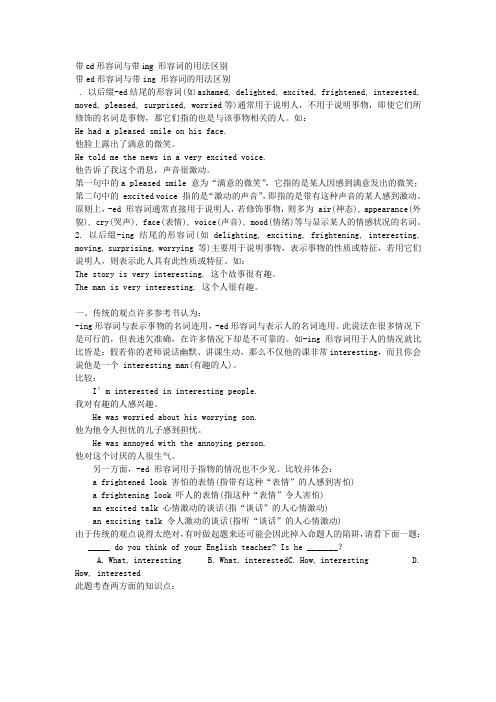
带ed形容词与带ing 形容词的用法区别带ed形容词与带ing 形容词的用法区别. 以后缀-ed结尾的形容词(如ashamed, delighted, excited, frightened, interested, moved, pleased, surprised, worried等)通常用于说明人,不用于说明事物,即使它们所修饰的名词是事物,那它们指的也是与该事物相关的人。
如:He had a pleased smile on his face.他脸上露出了满意的微笑。
He told me the news in a very excited voice.他告诉了我这个消息,声音很激动。
第一句中的a pleased smile 意为“满意的微笑”,它指的是某人因感到满意发出的微笑;第二句中的 excited voice 指的是“激动的声音”,即指的是带有这种声音的某人感到激动。
原则上,-ed 形容词通常直接用于说明人,若修饰事物,则多为 air(神态), appearance(外貌), cry(哭声), face(表情), voice(声音), mood(情绪)等与显示某人的情感状况的名词。
2. 以后缀-ing结尾的形容词(如delighting, exciting, frightening, interesting, moving, surprising, worrying 等)主要用于说明事物,表示事物的性质或特征,若用它们说明人,则表示此人具有此性质或特征。
如:The story is very interesting. 这个故事很有趣。
The man is very interesting. 这个人很有趣。
一、传统的观点许多参考书认为:-ing形容词与表示事物的名词连用,-ed形容词与表示人的名词连用。
此说法在很多情况下是可行的,但表述欠准确,在许多情况下却是不可靠的。
如-ing 形容词用于人的情况就比比皆是:假若你的老师说话幽默、讲课生动,那么不仅他的课非常interesting,而且你会说他是一个 interesting man(有趣的人)。
(完整版)-ed形容词和-ing形容词辨析和练习
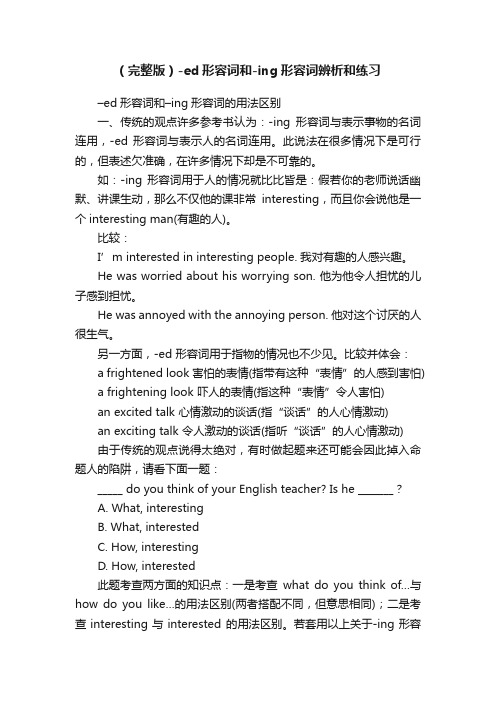
(完整版)-ed形容词和-ing形容词辨析和练习–ed形容词和–ing形容词的用法区别一、传统的观点许多参考书认为:-ing形容词与表示事物的名词连用,-ed 形容词与表示人的名词连用。
此说法在很多情况下是可行的,但表述欠准确,在许多情况下却是不可靠的。
如:-ing 形容词用于人的情况就比比皆是:假若你的老师说话幽默、讲课生动,那么不仅他的课非常interesting,而且你会说他是一个interesting man(有趣的人)。
比较:I’m interested in interesting people. 我对有趣的人感兴趣。
He was worried about his worrying son. 他为他令人担忧的儿子感到担忧。
He was annoyed with the annoying person. 他对这个讨厌的人很生气。
另一方面,-ed 形容词用于指物的情况也不少见。
比较并体会:a frightened look 害怕的表情(指带有这种“表情”的人感到害怕)a frightening look 吓人的表情(指这种“表情”令人害怕)an excited talk 心情激动的谈话(指“谈话”的人心情激动)an exciting talk 令人激动的谈话(指听“谈话”的人心情激动)由于传统的观点说得太绝对,有时做起题来还可能会因此掉入命题人的陷阱,请看下面一题:_____ do you think of your English teacher? Is he _______?A. What, interestingB. What, interestedC. How, interestingD. How, interested此题考查两方面的知识点:一是考查what do you think of…与how do you like…的用法区别(两者搭配不同,但意思相同);二是考查interesting与interested 的用法区别。
- 1、下载文档前请自行甄别文档内容的完整性,平台不提供额外的编辑、内容补充、找答案等附加服务。
- 2、"仅部分预览"的文档,不可在线预览部分如存在完整性等问题,可反馈申请退款(可完整预览的文档不适用该条件!)。
- 3、如文档侵犯您的权益,请联系客服反馈,我们会尽快为您处理(人工客服工作时间:9:00-18:30)。
-ed and –ing adjectives
Adjectives that end ‘-ed’ (e.g. ‘bored’, ‘interested’) and adjectives that end ‘-ing’ (e.g. ‘boring’, ‘interesting’) are often confused.
-ed adjectives
Adjectives that end ‘-ed’ describe emotions – they tell us how people feel about something.
∙I was very bored in the maths lesson. I almost fell asleep.
∙He was surprised to see Helen. She’d told him she was going to Australia.
∙Feeling tired and depressed, he went to bed.
-ing adjectives
Adjectives that end ‘-ing’ describe the thin g that causes the emotion – a boring lesson makes you feel bored.
∙Have you seen that film? It’s absolutely terrifying.
∙I could listen to him for hours. He’s one of the most interesting people I’ve ever met.
∙I can’t eat this! It’s disgusting! What is it?
Remember that people can be boring but only if they make other people
feel bored.
∙He talks about the weather for hours. He’s so boring.
∙NOT I was very boring at the party so I went home.
Here are some more adjectives that can have both an ‘-ed’ and an ‘-ing’ form
∙amused
∙amusing
∙annoyed
∙annoying
∙confused
∙confusing
∙disappointed
∙disappointing
∙excited
∙exciting
∙exhausted
∙exhausting
∙frightened
∙frightening
∙satisfied
∙satisfying
∙shocked
shocking。
